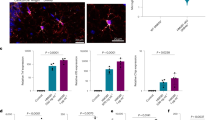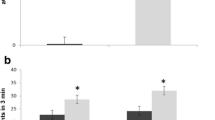Abstract
In addition to the well-defined neurologic events due to arterial and venous thrombotic vascular occlusions of antiphospholipid syndrome (APS), a broad spectrum of neuropsychiatric has been related to antiphospholipid (aPL). Experimental evidence of a pathogenic role of aPL in mice with impaired neurological function disclosed inflammatory reaction as a hallmark. The process that leads to neurological dysfunction seems to be both structurally destructive and functionally impairing. The most modern resources of neuroimmaging also suggest that, in addition to the micro-infarcts that occur in strategic areas, other metabolic impairments are related to progressive dementia and aPL presence. Although there is a lot of confusion among APS and lupus’ cognitive involvement, there is a body of experimental and clinical evidence that aPL causes this kind of damage.

Similar content being viewed by others
References
Sanna G, Bertolaccini ML, Cuadrado MJ et al (2003) Central nervous system involvement in the antiphospholipid (Hughes) syndrome. Rheumatology 42:200–213
Ziporen L, Shoenfeld Y, Levy Y, Korczyn AD (1997) Neurological dysfunction and hyperactive behavior associated with antiphospholipid antibodies. A mouse model. J Clin Invest 100(3):613–619
Hess DC, Taormina M, Thompson J et al (1993) Cognitive and neurologic deficits in the MRL/lpr mouse: a clinicopathologic study. J Rheumatol 20(4):610–617
Shoenfeld Y, Nahum A, Korczyn AD et al (2003) Neuronal-binding antibodies from patients with antiphospholipid syndrome induce cognitive deficits following intrathecal passive transfer. Lupus 12:436–442
Caronti B, Pittoni V, Palladini G, Valesini G (1998) Anti-beta 2-glycoprotein I antibodies bind to central nervous system. J Neurol Sci 156(2):211–219
Caronti B, Calderaro C, Alessandri C et al (1998) Serum anti-beta2-glycoprotein I antibodies from patients with antiphospholipid antibody syndrome bind central nervous system cells. J Autoimmun 11(5):425–429
Chapman J, Cohen-Armon M, Shoenfeld Y, Korczyn AD (1999) Antiphospholipid antibodies permeabilize and depolarize brain synaptoneurosomes. Lupus 8(2):127–133
Cimaz R, Meroni PL, Shoenfeld Y (2006) Epilepsy as part of systemic lupus erythematosus and systemic antiphospholipid syndrome (Hughe’s syndrome). Lupus 15(4):191–197
Chinn RJ, Wilkinson ID, Hall-Craggs MA et al (1997) Magnetic resonance imaging of the brain and cerebral proton spectroscopy in patients with systemic lupus erythematosus. Arthritis Rheum 40(1):36–46
Kozora E, West SG, Kotzin BL et al (1998) Magnetic resonance imaging abnormalities and cognitive deficits in systemic lupus erythematosus patients without overt central nervous system disease. Arthritis Rheum 41(1):41–47
Hilker R, Thiel A, Geisen C, Rudolf J (2000) Cerebral blood flow and glucose metabolism in multi-infarct-dementia related to primary antiphospholipid antibody syndrome. Lupus 9(4):311–316
Sibbitt WL Jr, Haseler LJ, Griffey RR et al Neurometabolism of active neuropsychiatric lupus determined with proton MR spectroscopy. Am J Neuroradiol YEAR 18:1271–1277
Sabet A, Sibbitt WL Jr, Stidley CA et al (1998) Neurometabolite markers of cerebral injury in the antiphospholipid antibody syndrome of systemic lupus erythematosus. Stroke 29:2254–2260
Kozora E, Arciniegas DB, Filley CM et al (2005) Cognition, MRS neurometabolites, and MRI volumetrics in non-neuropsychiatric systemic lupus erythematosus: preliminary data. Cogn Behav Neurol 18(3):159–162
Appenzeller S, Li LM, Costallat L, Cendes F (2005) Evidence of reversible axonal dysfunction in systemic lupus erythematosus: a proton MRS study. Brain 128(12):2933–2940
Castellino G, Govoni M, Padovan M et al (2005) Proton magnetic resonance spectroscopy may predict future brain lesions in SLE patients: a functional multi-imaging approach and follow up. Ann Rheum Dis 64:1022–1027
Author information
Authors and Affiliations
Corresponding author
Rights and permissions
About this article
Cite this article
Liberato, B., Levy, R.A. Antiphospholipid Syndrome and Cognition. Clinic Rev Allerg Immunol 32, 188–191 (2007). https://doi.org/10.1007/s12016-007-0007-x
Published:
Issue Date:
DOI: https://doi.org/10.1007/s12016-007-0007-x




